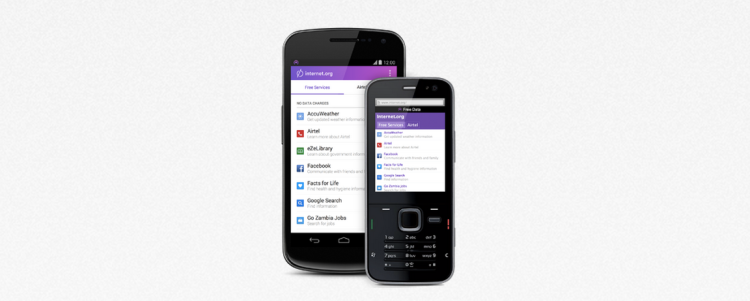Facebook just inched a bit further in its quest to take over the world.
Internet.org, the branch of Facebook that loftily aims to bring Internet access to everyone, announced that it will release an Internet.org app in Zambia in partnership with Zambia’s most popular wireless operator Bharti Airtel. And, yes, the app ships with Internet connectivity, free of charge (except for the small amount needed to download it).
Facebook says that while more than 85 percent of the world’s population lives within cellular range, only 30 percent currently access the Internet, and much of this gap is due to cost. The idea here is to give Zambians free access to Facebook and hope they will eventually want to expand their Internet access and purchase data plans from Airtel. Facebook plans to eventually expand to other countries as well.
Zambians can access Facebook in three ways: Through Internet.org’s website, through the Internet.org app, and through the Facebook app for Android which has an Internet.org tab.
The Internet.org app is designed to work on low-end Android devices and will provide users access to the following services:
- AccuWeather
Airtel
eZeLibrary
Facebook
Facts for Life
Google Search
Go Zambia Jobs
Kokoliko
MAMA (Mobile Alliance for Maternal Action)
Messenger
Wikipedia
WRAPP (Women’s Rights App)
Zambia uReport
The partnerships with the above services are not necessarily formal, Facebook told TechCrunch.
Facebook CEO Mark Zuckerberg first announced Internet.org a year ago. Back in February at the Mobile World Congress in Barcelona, he advocated for carriers to provide free basic Internet access to developing countries. Internet.org, has since partnered up with Ericsson and opened the Connectivity Lab, which simulates the infrastructure conditions of developing conditions, to help its own teams and others better develop apps for those countries.
These are not Facebook’s first efforts to gain ground in developing countries. Back in 2010, Facebook launched “Zero,” an app optimized for feature phones, in the hopes of gaining more users in developing countries, where, because of smartphones’ high prices, feature phones are still common.
Then in 2011, the social network launched “Facebook for every phone,” another mobile version of the site that is compatible with 2,500 different mobile phones.
Last week, Facebook posted its second quarter earnings, with a strong showing in mobile and mobile advertising. It also revealed that much of its user base growth is happening outside the U.S. and Europe, mostly in developing countries.
VentureBeat's mission is to be a digital town square for technical decision-makers to gain knowledge about transformative enterprise technology and transact. Learn More

